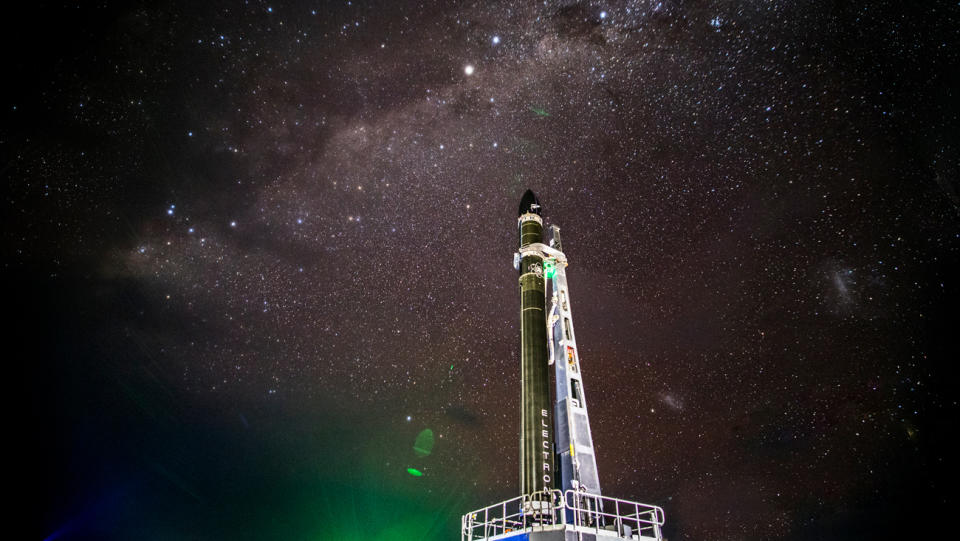Building rockets and looking for life on Venus: Q&A with Rocket Lab's Peter Beck

COLORADO SPRINGS — Extremely busy with an eye on the future. That's a short and sweet assessment of Rocket Lab's founder and CEO, Peter Beck. In the pantheon of private space groups, Rocket Lab is a roaring success, and Beck wants to keep it that way.
Founded in 2006, Rocket Lab's quest to pioneer affordable access to space was shouldered by its development of Electron, a launch vehicle designed to give small satellites dedicated rides to orbit. The rocket's first successful orbital jaunt took place in January 2018 from the company's New Zealand launch site, located on the North Island's Māhia Peninsula.
Fast forward to today, and Electron has flown 46 times, lofting more than 180 satellites for private and public sector organizations, including U.S. national security payloads.
Headquartered in Long Beach, California, Rocket Lab has a trio of launch pads, two sited in New Zealand and a third in Virginia, on Wallops Island. In addition, the company's Photon spacecraft platform has been selected to support NASA missions to the moon and Mars, and Rocket Lab plans to send a Photon on a private life-hunting mission to Venus.

Now at the top of the company's to-do list is developing the larger, partially reusable Neutron rocket for deploying large spacecraft and satellite constellations.
As this short summary shows, Rocket Lab has a lot of irons in the fire.
"We joke that a Rocket Lab year is like a dog year," Beck said. "One Rocket Lab year feels like five."
In an exclusive interview, Space.com caught up with the enterprising entrepreneur during the Space Foundation's 39th Space Symposium, held here earlier this month. The following conversation has been edited for length.
Related: Facts and information about Rocket Lab
Space.com: The track record for space startups is spotty — lots of companies have come and gone. What do you point to about your success and growth?
Peter Beck: I feel like an old person in the community now. First of all, I think we're very pragmatic. Execution is the key focus. One of the things about the space industry that I've observed in entering it is that so many businesses develop something cool and then try and figure out how to sell it. We identify problems and then go and solve problems. By creating value, then you've built something that people want.
Space.com: What problem was it that you first tackled?
Beck: Initially, it was Electron. There is tremendous growth in the small satellite industry and the requirement for a small, dedicated launcher. So we started there. The plan was always much more grand.
Space.com: How do you temper 'more grand?'
Beck: Half of my brain is the go-getter entrepreneur. The other half of my brain is the engineer realist. And they wrestle with each other all the time. We kind of end up in the middle … We're ambitious and we go after big things. But we're also very cautious and pragmatic about how we go about and execute them. We never bet the company on anything. We take it step-by-step and continue to grow.
Space.com: Can you grow too fast, making it difficult to keep an eye on everything?
Beck: It doesn't look like it's getting quieter, that's for sure. Rocket Lab has a very distinctive and different culture. We've bought companies. So when you buy a company, that's another cultural challenge. But it's pretty simple. Just do what you said you were going to do and execute. We're around 1,800 people, and that's more than I thought we'd ever have. I think if you anchor to some key elements and understand what makes you special, and then anchor to those, that is important.
Space.com: What milestones are ahead, say over a year's time?
Beck: Two-thirds of our revenue comes from our space systems business. A lot of people see us as a rocket company. It didn't help when we named ourselves Rocket Lab. We're an end-to-end space company, providing spacecraft design and manufacturing services, along with satellite components, flight software, and other things. We're now shoulder to shoulder with the other primes.
The big sucking sound in the room is the Neutron launch vehicle. We've just got to get it to the pad. There are a lot of people that want that booster on the pad. We've got a big job ahead of us, not only to have it on the pad, but to get Neutron into production and provide it as a reliable alternative in launch.

Space.com: In the space exploration side of Rocket Lab, what about your private Venus mission?
Beck: This is an example of where the entrepreneur gets a little carried away, but the engineer reins it in. As a private project, it's a nights-and-weekends thing for the team. Anybody involved brings their own resources. I confess, I love interplanetary, and it's really born from the drive to answer the question, Are we the only life in the universe or no? Venus has the potential to answer that question, so that's worthy of doing.
But we have a whole bunch of customers, satellites to build, rockets to deliver. So the Venus mission keeps getting moved to the side because we have a business to run. But if the entrepreneur side took over, we'd go launch that tomorrow. The reality is that we have to deliver for our customers first.
There's a good Venus window next year, so maybe. I'm not going to commit to it. It depends on where we're at. We've got a lot going on at the moment and big contracts to fill.
Related: Life on Venus? Why it's not an absurd thought
RELATED STORIES:
— Rocket Lab launches 4 private satellites, recovers booster from the sea (video)
— Rocket Lab targets late 2024 for private Venus mission launch
— NASA's tiny CAPSTONE cubesat launches on pioneering moon mission
Space.com: Rocket Lab acts as mission control for several spacecraft, like the private MethaneSat and Varda Space Industries' in-space manufacturing effort that makes use of your Photon spacecraft. Why is that role important to the company?
Beck: At the end of the day, we're trying to build an end-to-end space company, and that includes mission operations. We can design, build your spacecraft and operate them. The large successful space companies in the future are going to like the model we're building.
Space.com: Rocket Lab has also suffered launch failures. How painful is that experience, and how good are you at eking out the root cause?
Beck: We are very strong at that, unfortunately. We invite all of our customers into a failure review board, and we're proud of that. Electron is a highly instrumented vehicle, and we monitor so many things very closely on every flight. Every flight we have big data reviews using AI [artificial intelligence] to consume the data and look for any anomalies or anything out of family. It's all part of making sure you don't fail. But it happens.
The last failure was like 10 different things that all had to line up and that we had to painstakingly back out with thousands of hours of testing. The chain of events that had to occur for that last anomaly are phenomenal. This is the hard thing about launch in particular. It takes no prisoners. There's no room for any kind of assumptions.
Space.com: Your success outstrips your mishaps. What's taking place on the factory floor at Rocket Lab, in terms of manufacturing?
Beck: Manufacturing is manufacturing. I don't think fundamentally anything has changed. Certainly there's a bunch of technologies, like 3D printing. We were the first to put a 3D printed engine in orbit. Some companies have made an entire thesis around 3D printing a rocket. That makes no sense to me. There are a lot of buzz words.
Since the 1950s, metallics haven't changed. Aluminum is the same strength, as is stainless steel. What has changed is the rise of carbon fiber. We implement that exclusively throughout the whole launch vehicle. That gives us a real edge with respect to lightweight structures.
Space.com: How do you see Rocket Lab in five or 10 years' time?
Beck: That's a long time to look forward. But I do think the large, successful space companies will model what we're building. That is, you have got your own launch. You have the ability to build whatever satellites you want at scale. You can deploy infrastructure at scale. That's where it's all going to go.
The evidence of that is Starlink right now. SpaceX is not going away. If you want to compete with them, then you need to build whatever satellite you need to build and have your own ride to space.
